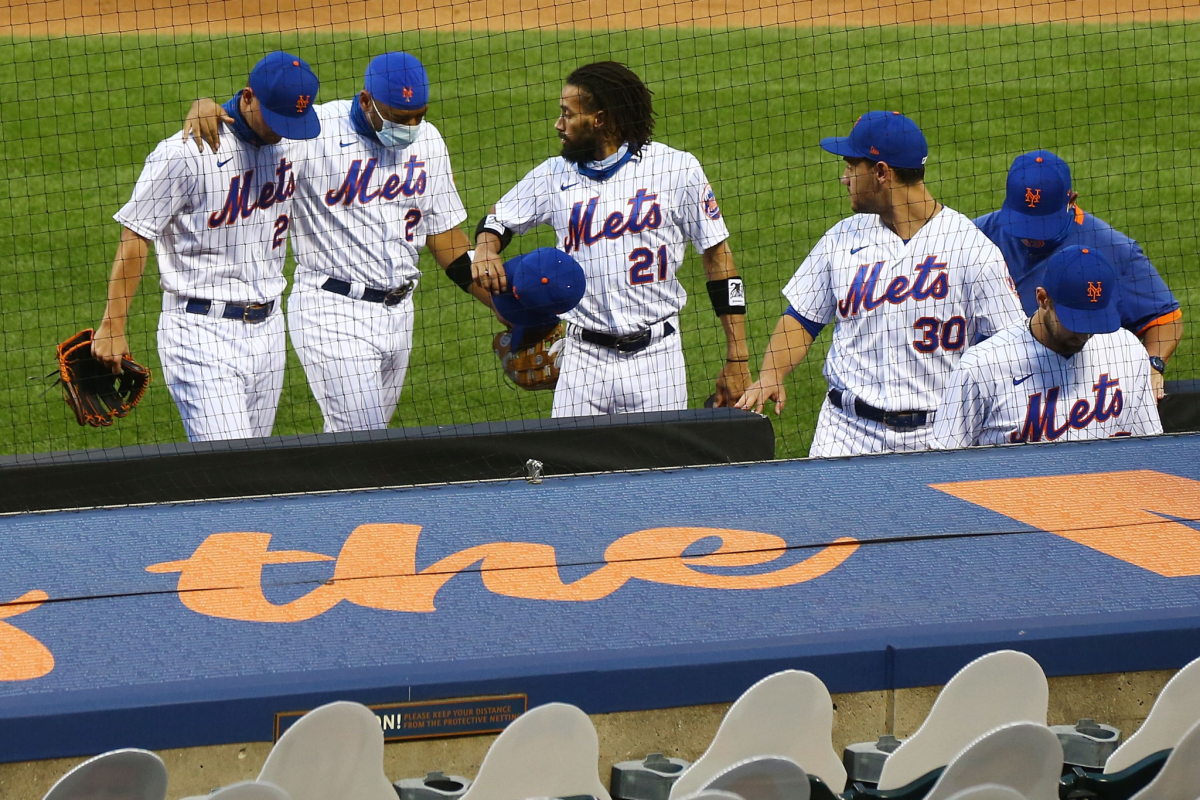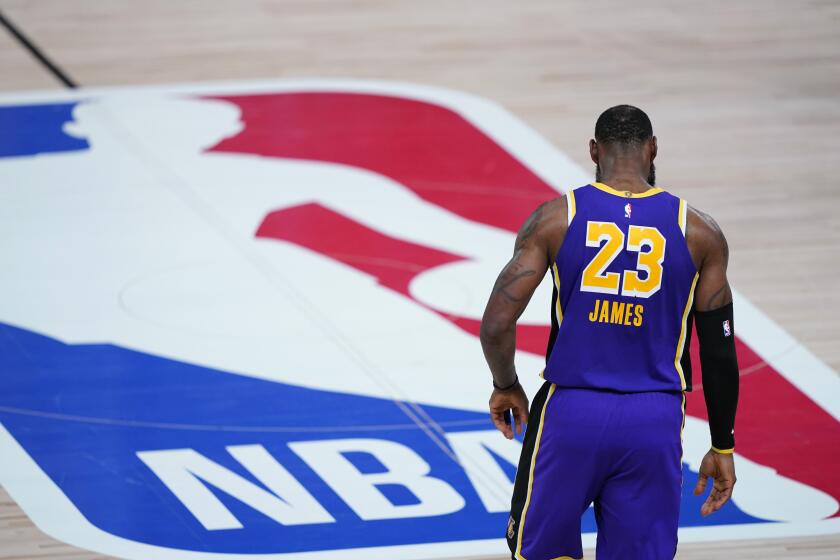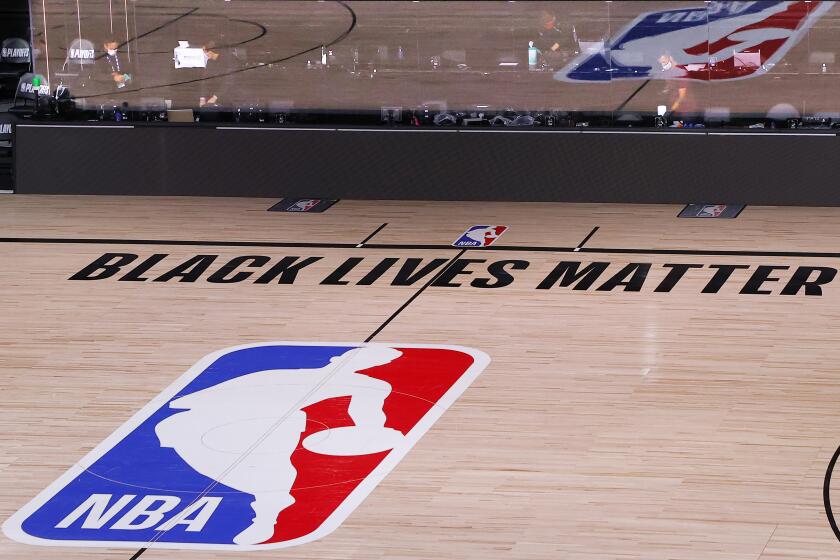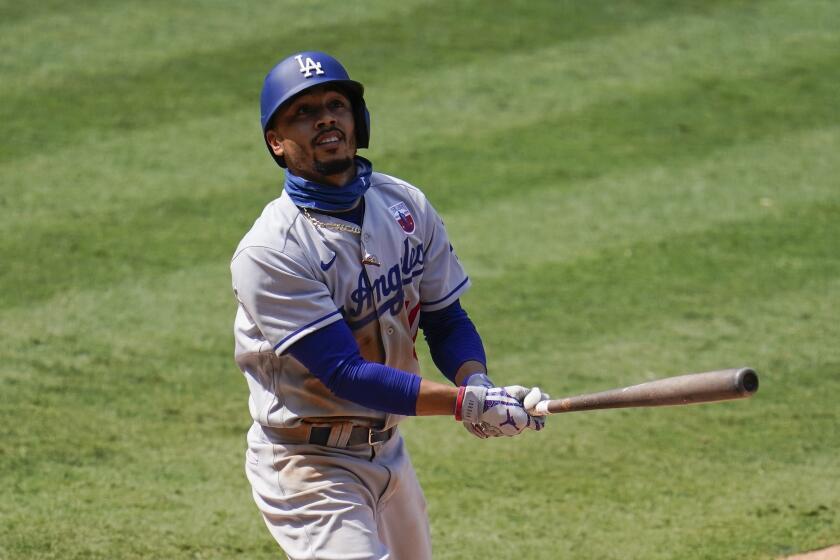MLB created Jackie Robinson Day, but the NBA is showing how to honor it

- Share via
The story of Jackie Robinson is this: The Dodgers led, and Major League Baseball followed.
On Jackie Robinson Day, the story could have been the same, with a new and timely purpose: The Dodgers led, and MLB followed.
Friday marked 75 years to the day that Dodgers President Branch Rickey told Robinson the team would like to sign him, to make him the player who would integrate the major leagues. After players called off 10 games this week because they believed Black lives still do not truly matter in the United States, and with Jackie Robinson Day already scheduled Friday, MLB whiffed on what should have been an obvious announcement.
With dynamic leadership and player unity, the NBA stole the spotlight on Jackie Robinson Day.
On Wednesday, MLB players followed NBA players in walking out. The only comment from MLB Commissioner Rob Manfred since then: a one-paragraph statement Thursday night, in which Manfred denied he had made the ridiculous suggestion that the New York Mets should walk off the field as a statement, then come right back on the field and play. New York Mets general manager Brodie Van Wagenen blamed owner Jeff Wilpon for the idea, but Van Wagenen already had been caught on tape saying this of Manfred: “At a leadership level, he doesn’t get it.”
A look at how the players’ walkout went from the precipice of shutting down the NBA to coming to an agreement to continue the playoffs.
In truth, we do not need to hear from Manfred right now. We need to hear from the players finding their voice, and raising it.
We need the words, and the tears, of Mets outfielder Dom Smith: “I think the most difficult part is to see people still don’t care. For this to just continually happen, it just shows just the hate in people’s hearts.”
We need to hear the words, and the support for Dodgers teammate Mookie Betts, of Clayton Kershaw: “We made a collective group decision to not play tonight, to let our voices be heard for standing up for what we believe is right.”
We need to hear the words, and the pain, of Colorado Rockies shortstop Trevor Story, who played on a night teammate Matt Kemp did not: “We had a chance to stand up for our guy last night. We didn’t do that.”
We need to hear the words, and the frustration, of Kemp’s mother, Judy Henderson: “One of the reasons I love the Dodger Organization. Mookie’s teammates stood with him in solidarity. The whole team! Not just the Black players protested — the whole team protested!!”
We need to hear the words, and the outrage, of St. Louis Cardinals pitcher Jack Flaherty, who wondered why MLB had not called off its schedule Thursday when the NBA and NHL had: “By the NBA not playing [Wednesday], you had to listen. You had to listen to, well, why? Well, because of what went on in Wisconsin. Because of what is going on since George Floyd was murdered, and what has gone on for the last 400 years.”
Athletes in the NBA, WNBA, MLB, MLS, NFL, NHL and professional tennis refused to take part in scheduled events in protest of the shooting of Jacob Blake.
However, in order to transform anger into action, players need a partnership. When LeBron James focused on voting rights, he found partners in Dodgers pitcher David Price, the Dodgers, and county and state officials. As a result, the Dodgers announced two weeks ago that Dodger Stadium would become the first major league ballpark to be used as a polling place.
In Wisconsin, where Jacob Blake was shot seven times by police last Sunday, citizens stood in line for hours during a pandemic to vote in the April primary; courts had rejected efforts to postpone the election or extend the time to return absentee ballots.
To offer a stadium-sized polling place is tangible action. The Nationals have joined the Dodgers in making their ballpark available as a polling place. With the urging of Flaherty, the Cardinals are looking into it.
Robinson is remembered as a groundbreaking baseball player, and a Hall of Famer. But he was an activist too, and an encounter he described with a police officer in 1971 would seem every bit as likely to happen today: “It horrifies me to realize what might have happened if I had been just another citizen of Harlem. It shouldn’t be necessary to be named Jackie Robinson to keep from getting brutalized.”
Police reform is enacted by elected officials, which makes voting the highest of priorities. The words we wanted to hear from Manfred on Jackie Robinson Day were these: “Today, Major League Baseball commits to work to make all of its ballparks available as polling places.”
Dodgers outfielder Mookie Betts narrated a profound and pointed video that was shared by MLB’s social media accounts on Jackie Robinson Day.
Instead, the NBA made that announcement Friday, after two days of player protests.
For MLB, the opportunity lost was only in the timing. The league does plan to take action, and soon.
MLB has joined the Civic Alliance, a group of more than 100 major companies working to expand voting rights and secure polling places. The league expects to announce a variety of initiatives next week, working with players and teams to promote voter education, registration, and civic engagement.
The league plans to go beyond ballpark polling places by reaching out to fans and even families, through the boys and girls that participate in the youth programs sponsored by MLB.
Every MLB player will wear No. 42 on Friday in tribute to Robinson. But the civic engagement might be a more fitting tribute, for as Betts quoted Robinson in a heartfelt video released by the league Friday, “Life is not a spectator sport. If you’re going to spend your whole life in the grandstand just watching what goes on, in my opinion, you’re wasting your life.”
More to Read
Go beyond the scoreboard
Get the latest on L.A.'s teams in the daily Sports Report newsletter.
You may occasionally receive promotional content from the Los Angeles Times.














